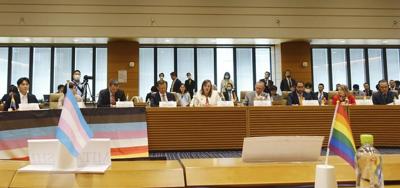Japanese LGBTQ activists and supporters on Thursday held an inaugural Pride 7 Summit in Tokyo, where they called on Group of Seven governments to promote and strengthen support and legal protections for LGBTQ people and urged Japan's government to enact an anti-discrimination law before it hosts this year’s G-7 summit in May.
Japan is the only G-7 country that does not recognize same-sex marriage or provide other equal rights protections for LGBTQ people.
Participants at the Pride 7 Summit called on the G-7 to protect the rights of LGBTQ people and prohibit discrimination throughout society. The Pride 7 engagement group will finalize the wording of a draft communique and submit it to each G-7 nation by the end of April, said Kanae Doi, Japan director of Human Rights Watch and a P-7 organizer.
P-7 was established in March to make policy proposals to step up efforts ahead of the G-7 summit, which will be held in Hiroshima. While momentum is on the rise ahead of the G-7, experts say legalizing an anti-discrimination law for LGBTQ people would have to wait some time if they miss this chance.
Makiko Terahara of the equal rights group Marriage for All Japan who is on the executive committee for Pride 7 said LGBTQ people have been fighting to achieve legislation for anti-discrimination, marriage equality and gender recognition without “inhuman” requirements including the removal of reproductive organs.
Terahara said that Japan, as the only G-7 nation in Asia and chair of this year's summit, should lead efforts to address these issues including the enactment of an anti-discrimination law.
“The necessary legislation is not only a minimum requirement for them to be able to live as they are, but also a symbolic step toward eliminating underlying discrimination and prejudice against them,” Terahara said.
Thursday's summit was attended by consuls and other senior officials from G-7 nations and the European Union, and lawmakers and representatives from economic organizations, labor unions and other organizations.
Rights activists say Japan's conservative government has stonewalled the push for equal rights supported by the general public. Support for LGBTQ people in Japan has come slowly, but recent surveys show the majority of Japanese support legalizing same-sex marriage. Support among the business community has rapidly increased.
Moriaki Kida, chairperson and CEO of EY Japan, an affiliate of the global accounting and consultancy firm, said Japan has been losing talented people to other economies because it doesn't have an equality law and due to its refusal to recognize same-sex marriage.
Patrick Jordan of Coca-Cola (Japan) Co. said when he moved to Japan his husband was not recognized as his legal spouse, even though his heterosexual friends' husbands and wives were recognized.
“I wish I did not have to experience this discrimination,” he said, adding that the experience prompted him to believe that Japan would benefit greatly by recognizing equal rights for LGBTQ people.
Kishida has insisted that allowing same-sex marriage would change Japan’s family values and society and that it requires careful consideration. He has not clearly expressed his view and is seen as indecisive as he governs the ultra-conservatives in his party who object to a law spelling out anti-discrimination against LGBTQ people.
LGBTQ activists and their supporters have increased their efforts to achieve an anti-discrimination law following discriminatory remarks in February by a former Kishida aide, who said he wouldn’t want to live next to LGBTQ people and that citizens would flee Japan if same-sex marriage were allowed.
Following national outrage over the remarks, Kishida’s governing Liberal Democratic Party and other non-partisan lawmakers have begun preparing legislation to promote awareness of LGBTQ rights, but some conservatives have shown resistance and progress is uncertain.








































